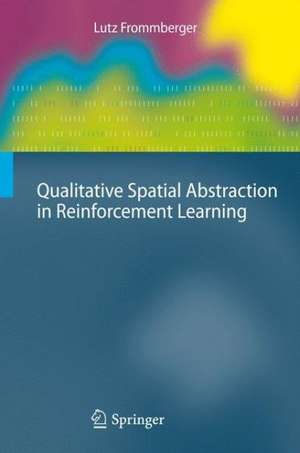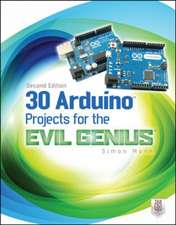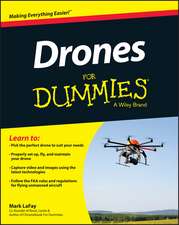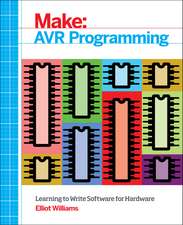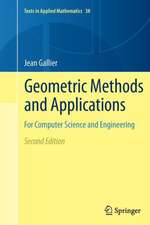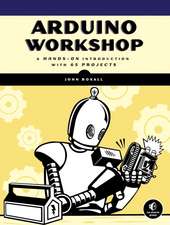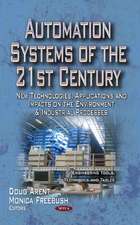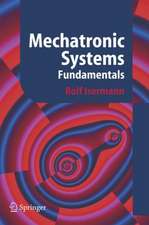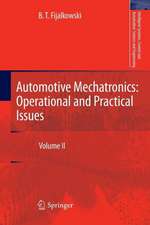Qualitative Spatial Abstraction in Reinforcement Learning: Cognitive Technologies
Autor Lutz Frommbergeren Limba Engleză Paperback – 2 ian 2013
In this book the author investigates whether deficiencies of reinforcement learning can be overcome by suitable abstraction methods. He discusses various forms of spatial abstraction, in particular qualitative abstraction, a form of representing knowledge that has been thoroughly investigated and successfully applied in spatial cognition research. With his approach, he exploits spatial structures and structural similarity to support the learning process by abstracting from less important features and stressing the essential ones. The author demonstrates his learning approach and the transferability of knowledge by having his system learn in a virtual robot simulation system and consequently transfer the acquired knowledge to a physical robot. The approach is influenced by findings from cognitive science.
The book is suitable for researchers working in artificial intelligence, in particular knowledge representation, learning, spatial cognition, and robotics.
| Toate formatele și edițiile | Preț | Express |
|---|---|---|
| Paperback (1) | 640.51 lei 6-8 săpt. | |
| Springer Berlin, Heidelberg – 2 ian 2013 | 640.51 lei 6-8 săpt. | |
| Hardback (1) | 644.81 lei 6-8 săpt. | |
| Springer Berlin, Heidelberg – 12 noi 2010 | 644.81 lei 6-8 săpt. |
Din seria Cognitive Technologies
- 20%
 Preț: 350.99 lei
Preț: 350.99 lei - 15%
 Preț: 649.71 lei
Preț: 649.71 lei - 20%
 Preț: 336.21 lei
Preț: 336.21 lei - 15%
 Preț: 635.47 lei
Preț: 635.47 lei - 20%
 Preț: 650.73 lei
Preț: 650.73 lei - 20%
 Preț: 644.15 lei
Preț: 644.15 lei - 20%
 Preț: 886.16 lei
Preț: 886.16 lei - 20%
 Preț: 331.91 lei
Preț: 331.91 lei -
 Preț: 390.63 lei
Preț: 390.63 lei - 20%
 Preț: 337.13 lei
Preț: 337.13 lei - 20%
 Preț: 1458.56 lei
Preț: 1458.56 lei - 20%
 Preț: 646.80 lei
Preț: 646.80 lei - 20%
 Preț: 994.08 lei
Preț: 994.08 lei - 20%
 Preț: 649.09 lei
Preț: 649.09 lei -
 Preț: 397.38 lei
Preț: 397.38 lei - 20%
 Preț: 988.00 lei
Preț: 988.00 lei - 20%
 Preț: 1009.61 lei
Preț: 1009.61 lei - 20%
 Preț: 597.18 lei
Preț: 597.18 lei - 20%
 Preț: 614.19 lei
Preț: 614.19 lei - 20%
 Preț: 675.51 lei
Preț: 675.51 lei - 20%
 Preț: 994.40 lei
Preț: 994.40 lei - 20%
 Preț: 891.89 lei
Preț: 891.89 lei - 20%
 Preț: 600.41 lei
Preț: 600.41 lei - 20%
 Preț: 533.76 lei
Preț: 533.76 lei - 20%
 Preț: 647.61 lei
Preț: 647.61 lei - 20%
 Preț: 645.14 lei
Preț: 645.14 lei - 20%
 Preț: 512.39 lei
Preț: 512.39 lei - 20%
 Preț: 338.68 lei
Preț: 338.68 lei - 20%
 Preț: 345.22 lei
Preț: 345.22 lei - 20%
 Preț: 668.55 lei
Preț: 668.55 lei -
 Preț: 365.21 lei
Preț: 365.21 lei - 20%
 Preț: 1297.17 lei
Preț: 1297.17 lei
Preț: 640.51 lei
Preț vechi: 800.64 lei
-20% Nou
Puncte Express: 961
Preț estimativ în valută:
122.58€ • 133.10$ • 102.96£
122.58€ • 133.10$ • 102.96£
Carte tipărită la comandă
Livrare economică 22 aprilie-06 mai
Preluare comenzi: 021 569.72.76
Specificații
ISBN-13: 9783642266003
ISBN-10: 3642266002
Pagini: 192
Ilustrații: XVII, 174 p.
Dimensiuni: 155 x 235 x 10 mm
Greutate: 0.28 kg
Ediția:2010
Editura: Springer Berlin, Heidelberg
Colecția Springer
Seria Cognitive Technologies
Locul publicării:Berlin, Heidelberg, Germany
ISBN-10: 3642266002
Pagini: 192
Ilustrații: XVII, 174 p.
Dimensiuni: 155 x 235 x 10 mm
Greutate: 0.28 kg
Ediția:2010
Editura: Springer Berlin, Heidelberg
Colecția Springer
Seria Cognitive Technologies
Locul publicării:Berlin, Heidelberg, Germany
Public țintă
ResearchCuprins
Foundations of Reinforcement Learning.- Abstraction and Knowledge Transfer in Reinforcement Learning.- Qualitative State Space Abstraction.- Generalization and Transfer Learning with Qualitative Spatial Abstraction.- RLPR – An Aspectualizable State Space Representation.- Empirical Evaluation.- Summary and Outlook.
Notă biografică
Dr. Frommberger is a researcher in the Cognitive Systems Research Group (SFB/TR 8 Spatial Cognition) of Universität Bremen; his special areas of expertise are spatial abstraction techniques, efficient reinforcement learning, cognitive logistics and qualitative representations of space.
Textul de pe ultima copertă
Reinforcement learning has developed as a successful learning approach for domains that are not fully understood and that are too complex to be described in closed form. However, reinforcement learning does not scale well to large and continuous problems. Furthermore, acquired knowledge specific to the learned task, and transfer of knowledge to new tasks is crucial.
In this book the author investigates whether deficiencies of reinforcement learning can be overcome by suitable abstraction methods. He discusses various forms of spatial abstraction, in particular qualitative abstraction, a form of representing knowledge that has been thoroughly investigated and successfully applied in spatial cognition research. With his approach, he exploits spatial structures and structural similarity to support the learning process by abstracting from less important features and stressing the essential ones. The author demonstrates his learning approach and the transferability of knowledge by having his system learn in a virtual robot simulation system and consequently transfer the acquired knowledge to a physical robot. The approach is influenced by findings from cognitive science.
The book is suitable for researchers working in artificial intelligence, in particular knowledge representation, learning, spatial cognition, and robotics.
In this book the author investigates whether deficiencies of reinforcement learning can be overcome by suitable abstraction methods. He discusses various forms of spatial abstraction, in particular qualitative abstraction, a form of representing knowledge that has been thoroughly investigated and successfully applied in spatial cognition research. With his approach, he exploits spatial structures and structural similarity to support the learning process by abstracting from less important features and stressing the essential ones. The author demonstrates his learning approach and the transferability of knowledge by having his system learn in a virtual robot simulation system and consequently transfer the acquired knowledge to a physical robot. The approach is influenced by findings from cognitive science.
The book is suitable for researchers working in artificial intelligence, in particular knowledge representation, learning, spatial cognition, and robotics.
Caracteristici
Book introduces many original ideas Significant contribution to the field of reinforcement learning Contains pointers to future research
